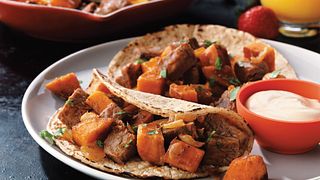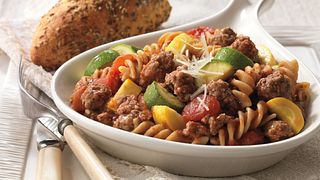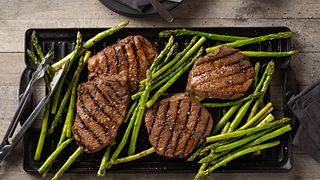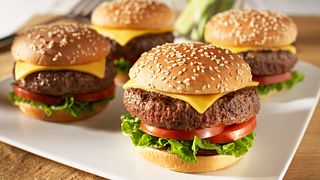Strength Starts In The Kitchen
Higher-protein diets are becoming more and more popular as people seek new ways to achieve weight loss that will also keep them feeling full and satisfied. Rose McAvoy of Plate Full of Grace not only has an incredible personal story but has made it her mission to help others enjoy the journey to better health, happier family life and joy in eating.
Plate Full of Grace
Meet Rose. Mom-trepreneur, mindset coach and lover of life. Like most of us, she's got her plate pretty full. She's your gal if you're looking to be the healthiest version of yourself, enjoy your favorite foods, and fill your life with joy and a whole lot of grace.
"Eating healthy should be a celebration of flavor! Lean beef is a delicious way to get powerful protein to help me reach my fitness goals, reduce cravings, and stay energized through my busy days of balancing work and family." -Rose McAvoy, Plate Full of Grace
Welcome to Rose's Kitchen
Dinner For Breakfast
Weekday Lunch Break
Family Pasta Night
Date Night Dinner
Beef W.I.S.E
Higher-protein diets are becoming more and more popular as people seek new ways to achieve weight loss that will also keep them feeling full and satisfied.(i) New research, called the Beef W.I.S.E. (Weight Improvement, Satisfaction and Energy) Study shows that lean beef can be as effective as other proteins for weight loss potential.(ii)
Lean Beef Promotes Weight Loss, Lean Bodies & Heart Health:
Eating lean beef, as part of a healthy, higher-protein diet, combined with exercise, can help people lose weight and fat mass while maintaining lean muscle and supporting a healthy heart. (ii)
Strong, Healthy Bodies
Weight loss should result in decreased body weight while preserving lean muscle to achieve a healthy body composition and overall strength. In this new study, lean beef – as part of a healthy, higher-protein diet, combined with exercise – helped people lose fat while preserving lean muscle. In fact, 90-95% of the weight lost came from fat.(ii)
Supports Heart Health
While following a higher-protein diet with lean beef, participants in the same study not only effectively lost weight and improved lean body composition – they also did so without negatively impacting risk factors for heart disease, such as total or LDL cholesterol or blood pressure.(ii)
Realistic Diets
Including a variety of foods people already enjoy can help them embrace and adhere to a healthy diet.(iii) This recent research study demonstrates that lean beef doesn’t have to be restricted in a higher-protein, weight loss diet and contributes to the growing body of evidence demonstrating the positive role of lean beef in a healthy diet.(iv,v,vi).
One Powerful Protein
Among the powerful combination of 10 essential nutrients beef is known for, protein may be one of the most notable. In fact, one 3 oz cooked serving of beef provides 50% of your Daily Value (25 grams) of this important nutrient—making it an excellent source! So let’s ditch those fad diets and consider how we fill our plates at each meal. It’s not only important to just get protein in at dinner or lunch, but to spread it throughout your day. This can really maximize the benefits above. Aim for 25-30 grams of protein at each meal and you’ll start to feel the difference.
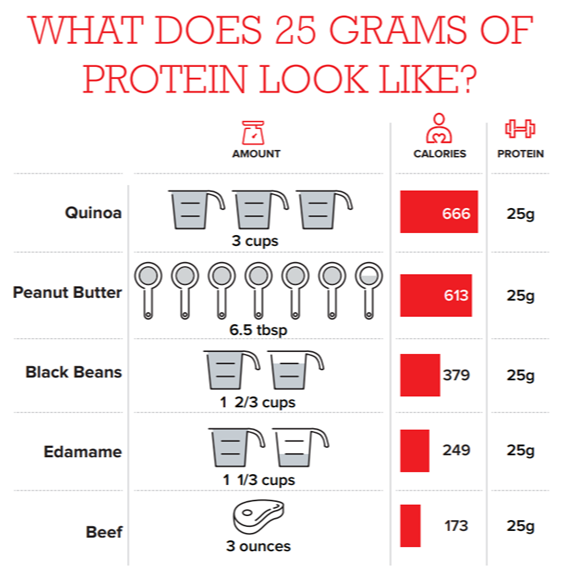
A wealth of research (1) has linked protein to favorable lifestyle markers such as healthy body weight and/or weight loss, maintaining and building muscle, and overall diet satisfaction. When you’re looking for ways to improve your health, manage your weight or satisfy your appetite, consider all that protein can do for you.
Feeling hungry? People who eat a higher-protein diet (about 30% of daily calories from protein) feel more satisfied, which may help prevent overeating.(2)
Protein helps support strong, lean bodies. Eating at least 4 ounces of high-quality protein from foods like beef at each meal provides your body with energy to lead an active lifestyle.(3)
Protein may help cut the fat. Research has shown exercise is more effective for weight management when paired with a higher-protein diet, and beef provides the amino acids necessary for building and replenishing muscles.(4)
Beef Nutrition Research Notations
i Leidy HJ et al. The role of protein in weight loss and maintenance. Am J Clin Nutr 2015;101:1320S-9S.
ii Sayer RD, et al. Equivalent reductions in body weight during the Beef WISE Study: Beef’s Role in Weight Improvement, Satisfaction, and Energy. Obes Sci Pract 2017. Available at: http://onlinelibrary.wiley.com/doi/10.1002/osp4.118/full
iii Wycherley TP, et al. Self-reported facilitators of, and impediments to maintenance of healthy lifestyle behaviours following a supervised research-based lifestyle intervention programme in patients with type 2 diabetes. Diabet Med 2012;29:632-9.
iv McNeill SH. Inclusion of red meat in healthful dietary patterns. Meat Sci 2014;98:452-60.
v Roussell MA, et al. Beef in an Optimal Lean Diet study: e ects on lipids, lipoproteins, and apolipoproteins. Am J Clin Nutr 2012;95:9-16.
vi Roussell MA, et al. E ects of a DASH-like diet containing lean beef on vascular health. J Hum Hypertens 2014;28:600-5.
1. Westerterp-Plantenga MS, et al. Dietary protein, metabolism, and body-weight regulation: dose–response effects. Int J Obes 2006;30:S16-S23. • Paddon-Jones D, et al. Protein, weight management, and satiety. Am J Clin Nutr 2008;87:1558S-61S. • Paddon-Jones D, et al. Role of dietary protein in the sarcopenia of aging. Am J Clin Nutr 2008;87:1562S-6S. • Wolfe, RR. The underappreciated role of muscle in health and disease. Am J Clin Nutr 2006;84:475-82. • Devkota S, Layman D. Protein metabolic roles in treatment of obesity. Curr Opin Clin Nutr Metab Care 2010;13:403-7.
2. Leidy HJ, et al. Beneficial effects of a higher-protein breakfast on the appetitive, hormonal, and neural signals controlling energy intake regulation in overweight/obese, "breakfast-skipping," late-adolescent girls. Am J Clin Nutr 2013;97:677-88. • Westerterp-Plantenga MS, Luscombe-Marsh N, Lejeune MPGM, Diepvens K, Nieuwenhuizen A, Engelen MPKJ, Deutz NEP, Azzout-Marniche D, Tome D, Westerterp KR. Dietary protein, metabolism, and body-weight regulation: dose–response effects. Int J Obes 2006;30:S16-S23. • Leidy HJ, Bossingham MJ, Mattes RD, Campbell WW. Increased dietary protein intake consumed at breakfast leads to an initial and sustained feeling of fullness during energy restriction compared to other meal times. Br J Nutr. 2009;101:798-803.
3. U.S. Department of Agriculture, Agricultural Research Service. 2015. USDA National Nutrient Database for Standard Reference, Release 28. Available at: http://www.ars.usda.gov/ba/bhnrc/ndl.
4. Layman DK, et al. Dietary protein and exercise have additive effects on body composition during weight loss in adult women. J Nutr 2005;135:1903-10. • Mamerow MM, Mettler JA, English KL, Casperson SL, Arentson-Lantz E, Sheffield-Moore M, Layman DK, Paddon-Jones D. Dietary Protein Distribution Positively Influences 24-h Muscle Protein Synthesis in Healthy Adults. J Nutr. 2014 Jan 29.
5. O’Neil CE, et al. Food sources of energy and nutrients among adults in the US: NHANES 2003–2006. Nutrients. 2012;4:2097-120.
6. USDA/ARS, 2016. USDA National Nutrient Database for Standard Reference, Release 28.

